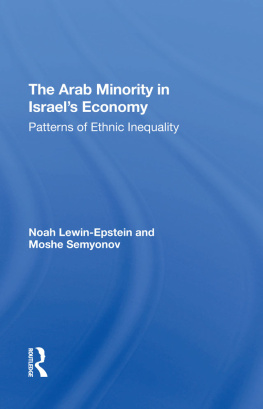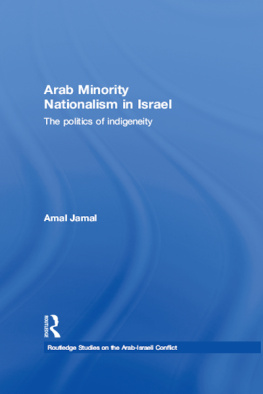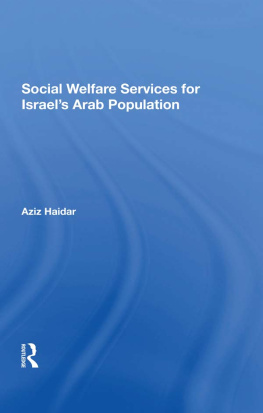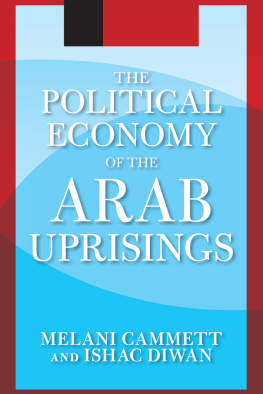The Arab Minority in Israel's Economy
Social Inequality Series
Marta Tienda and David . Grusky, Series Editors
The Arab Minority in Israel's Economy: Patterns of Ethnic Inequality, Noah Lewin-Epstein and Moshe Semyonov
Getting Started: Transition to Adulthood in Great Britain, Alan C. Kerckhoff
Equality and Achievement in Education, James S. Coleman
Ethnicity and the New Family Economy: Living Anangements and Intergenerational Financial Flows, edited by Frances K. Goldscheider and Calvin Goldscheider
Forthcoming
Persistent Inequality: Changing Educational Attainment in Thirteen Countries, edited by Yossi Shavit and Hans-Peter Blossfeld
Careers and Creativity: Social Forces in the Arts, Harrison C. White
Social Stratification: Class, Race, and Gender in Sociological Perspective, edited by David B. Grusky
Inequality and Aging, John Henretta and Angelo O'Rand
Children, Schools, and Inequality, Doris R. Entwisle and Karl Len Alexander
Between Two Worlds: Southeast Asian Refugee Youth in America, Ruben G. Rumbaut and Kenji Ima
The Arab Minority in Israel's Economy
Patterns of Ethnic Inequality
Noah Lewin-Epstein and Moshe Semyonov
First published 1993 by Westview Press, Inc.
Published 2019 by Routledge
52 Vanderbilt Avenue, New York, NY 10017
2 Park Square, Milton Park, Abingdon, Oxon OX14 4RN
Routledge is an imprint of the Taylor & Francis Group, an informa business
Copyright 1993 Taylor & Francis
All rights reserved. No part of this book may be reprinted or reproduced or utilised in any form or by any electronic, mechanical, or other means, now known or hereafter invented, including photocopying and recording, or in any information storage or retrieval system, without permission in writing from the publishers.
Notice:
Product or corporate names may be trademarks or registered trademarks, and are used only for identification and explanation without intent to infringe.
Library of Congress Cataloging-in-Publication Data
Lewin-Epstein, Noah.
The Arab minority in Israel's economy: patterns of ethnic inequality / Noah Lewin-Epstein and Moshe Semyonov.
p. cm.
Includes bibliographical references and index.
ISBN 0-8133-1525-5
1. Palestinian ArabsIsraelEconomic conditions. 2. Palestinian ArabsEmploymentIsrael. 3. Palestinian ArabsGovernment policy Israel. 4. IsraelEthnic relations. I. Semyonov, Moshe. II. Title.
HC415.25.L48 1993
330.95694'054'0899274dc20
92-47403
CIP
ISBN 13: 978-0-367-29015-3 (hbk)
To the memory of our fathers, Jacob Lewin-Epstein and Gabriel Semyonov
In a socially and economically integrated society the Arab citizens of Israel would long have been marked for special treatmentthe object of concerted compensatory policiesto redress their disadvantaged situation. Israel, however, is an ethnically divided society, in which the Arab population is a subordinate minority. Lagging behind in educational achievement, standard of living, and public services, the Arab sector has encountered for the most part a lack of concern on the part of Israel's (mostly Jewish) public and its leadership. By examining patterns of competition and inequality between Jews and Arabs we intend to both contribute to sociological knowledge and to draw out policy implications.
Israeli Arabs are citizens of the state. As citizens they enjoy formal political equality, but since its establishment over forty years ago Israel has not developed a genuine universalistic civil ideology that would equally embrace all its citizens, regardless of their ethnic affiliation. For many years the Arab citizens of Israel have been all but "invisible" on Israel's public agenda. One cannot escape the conclusion that the primary disposition of the governments of Israel has been to keep the Arabs in a segregated marginal position within the Jewish state. The "invisibility" of the Arab citizens of Israel was also manifest in mainstream social science discourse until quite recently.
The research reported in this book joins a modest, but growing, body of literature that aims to redress the paucity of scholarly work concerning what we consider to be the principal cleavage in Israeli society. In the following text we intend to explore the extent of disadvantage faced by Arabs, particularly in the realms of work and resource allocation, and to examine its sources and institutionalized patterns. As such, we intend the contribution of this book to be twofold: first, to provide a theoretical perspective on multi-ethnic societies based on the concept of group competition, and second, to highlight a crucial aspect of inequality in Israel and enhance our understanding of Israeli society. We hope that our endeavor will stimulate further interest in Jewish-Arab relations in Israel and serve as a catalyst for changes that will make Israel a more humanistic and universalistic society.
It is important to clarify at the outset that the research reported here concerns the Arab citizens of Israel those residing within the 1948 state borders. It does not include the residents of territories occupied by Israel since 1967 who are not citizens of Israel, and whose legal and political status is fundamentally different. The predicament of the latter undoubtedly deserves extensive investigation, and indeed our book Hewers of Wood and Drawers of Water, published in 1987, specifically addressed this issue. While recent events have clearly out-paced the bearings of past research, an updated examination of the topic is beyond the scope of the present monograph.
The decision to focus on the Arab citizens of Israel, rather than on Palestinians in general, reflects our conviction that the central issues facing Israeli Arabs and those residing in the occupied territories, although related, are fundamentally different, and they should not be confounded. In the forty-five years that Israeli Arabs have lived as a minority in the State of Israel they have emerged as a distinct segment of the Palestinian people. Although fully sympathetic to the plight of their brethren in the occupied territories, their interests are diverse, and their position as part of Israeli society plainly sets them apart. In no time has this been more evident than during the recent years of the Intifada. The aim of residents of the West Bank and Gaza is clearly to form a separate state. For Israeli Arabs, by way of contrast, the terms of participation in Israeli society are the central issue of concern.
This book is not intended to address all issues surrounding the condition of Arabs in Israeli society. In particular we do not deal with the matter of the realization on the part of Arabs not only of full citizenship but also full membership of the nation. We recognize that the problem of symbolic identification and Arabs' collective aspirations cannot be fully resolved without a fundamental metamorphosis of the State of Israel. We surmise, however, that addressing the issues of inequality and subordination in a systematic and pointed manner in itself may facilitate a "re-accommodation" of the Jewish majority and the Arab minority in Israel.
Throughout the book we use survey and census data, and we frequently employ statistical methods of analysis in order to provide precise details of the topics under discussion. Our data sources are varied although the overwhelming majority of statistical information comes from the Central Bureau of Statistics. We are fully aware of the difficulty in addressing broad issues of a fundamental nature, or of attempting to substantiate theoretical arguments, using statistical information depicting a particular period. This is a perennial problem facing researchers, which is accentuated when the data are measured at different points in time.











